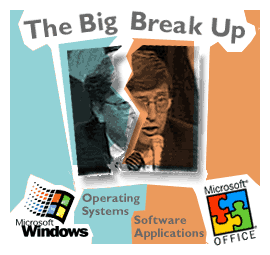|
Microsoft cites bias
|
 |
February 27, 2001: 5:37 p.m. ET
Appeals Court focuses on District Court judge's comments and their propriety
|
NEW YORK (CNNfn) - Lawyers for Microsoft and the U.S. Justice Department met in court again Tuesday, and the focus of the second and final day of hearings in the software company's antitrust appeal turned to the judge who ordered its breakup.
Attorneys for Microsoft told a panel of seven judges hearing the case that U.S. District Judge Thomas Penfield Jackson, who ruled against Microsoft last November, was "motivated by a desire to punish" the company.
Jackson ruled that Microsoft abused its monopoly power in the market for personal computer operating systems by integrating its Web browser into Windows, and ordered the company to split its business into two parts so as to prevent further abuse.
"The most draconian aspect of this decree was that it was motivated by an illegitimate desire to punish Microsoft," Microsoft attorney Steven Holley said. "He had reluctantly come to the conclusion that a structural remedy had become imperative because Microsoft, as it is currently led, is unwilling to accept that it broke the law."
The company's legal team argued that Jackson failed to take into account some 50 pieces of evidence and testimony of additional witnesses before reaching his final decision. 
Microsoft attorneys also suggested that Jackson's ruling against the company was biased and based on his own personal feeling about the company and its top executives.
In interviews with reporters and authors writing books on Microsoft's legal ordeal, Jackson made scathing attacks on company Chairman Bill Gates and Microsoft's legal team, as well as the U.S. Court of Appeals for the District of Columbia, where the case currently is being heard.
And at least some of the seven Appeals Court judges also were critical of Jackson Tuesday, expressing disappointment with his sharp public criticism of the company.
Judges have no right to "go run off our mouths" about cases they're hearing, said Harry Edwards, chief judge of the Appeals Court. "The system would be a sham if all judges went around doing this," Edwards said.
Judge David Sentelle even went so far as to tell the government's legal team, "I'm not sure how you can ask us with a straight face" to not consider possible bias in Jackson's comments.
Microsoft's attorney's argued that Jackson's comments in the press should be enough for the Court of Appeal to overturn his ruling.
Many legal analysts believe the Appeals Court, which ruled in favor of Microsoft in a related matter in 1998, represents the best chance for the world's largest software company to overturn or substantially weaken Jackson's ruling, which marks the most important antitrust case since the breakup of AT&T in 1984.
Even so, each side has faced harsh questioning from the judges considering the appeal. They have allotted two days for oral arguments in the case. Typically, the court allows about 30 minutes for oral arguments.
|

|
VIDEO
|
|
 CNNfn's Steve Young reports from Washington on second day of hearings. CNNfn's Steve Young reports from Washington on second day of hearings. |
|
Real
|
28K
|
80K
|
|
Windows Media
|
28K
|
80K
|
|
The government on Monday and earlier in the day Tuesday reiterated its now familiar argument that Microsoft tried to monopolize the Web Browsing software market with its "Internet Explorer" program, quashing Netscape, whose "Navigator" software was waning in popularity but still remained potentially profitable.
Microsoft's rebuttal has been that government's entire case was undermined by the widespread availability of Netscape's browser.
In the proceedings Tuesday, some of the judges suggested that the case could be sent back to a lower court for clarification.
Edwards, said that the district court had "made no finding of the appropriate market" for Internet browsers.
Judge David Sentelle added: "If there isn't a proper finding ... then we would have to at least send this back for some trial judge to weigh the facts, wouldn't we?"
 David Frederick, a Justice Department attorney, acknowledged "there was some lack of clarity" in Jackson's findings with respect to Microsoft's interactions with Netscape. But he argued the evidence was "quite clear" that Microsoft's purpose was to harm its rival. David Frederick, a Justice Department attorney, acknowledged "there was some lack of clarity" in Jackson's findings with respect to Microsoft's interactions with Netscape. But he argued the evidence was "quite clear" that Microsoft's purpose was to harm its rival.
On Monday, Chief Judge Edwards also criticized the idea of splitting Microsoft into two companies as a remedy for its anti-competitive practices, which many legal experts had seen as the strongest part of the government's case.
Several trial watchers walked away from the hearings saying they thought the Court was leaning in Microsoft's favor. However, its is not expected to hand down its ruling in the matter until the late spring or early summer of this year.
Shares of Microsoft (MSFT: Research, Estimates) traded higher on Nasdaq for the better part of Tuesday's session but finished 19 cents lower at $59.38.
-- from staff and wire reports 
|
|
|
|
|
 |

|

